Welcome back to Punished Notes! For the 33rd edition of my long-running series, I’ll go into a couple of this year’s best indies, returning to an Xbox 360 classic, the latest hit video game adaptation, and a note at the end on on why you maybe haven’t heard from me in a little while.
Balatro’s Masterful Take on Gambling and Casinos
So far, Balatro is one of 2024’s biggest out-of-nowhere indie sensations. The roguelite deck builder may seem like a classic Solitaire- or Poker-style game rearranged for virtual consumption, but its broad swath of challenges and potential strategies also make it a phenomenally well-designed video game, one that I can’t seem to get away from. Many have called this game addictive, but I’d actually go a step further: Balatro’s combination of number-crunching mechanics and passive, minimalist presentation serves as a playable commentary on gambling.
Without getting too deep into the weeds, a brief explanation of how Balatro works:
- The game incorporates a classic deck of 52 cards and tasks the player to achieve particular scores (as measured in chips) using standard poker hands. The player has a limited number of total hands they can play to achieve each challenge (known as a Blind) and also has a set number of discards they can use each Blind.
- The major twist, however, is the addition of various enhancements that tailor the player’s deck to their liking, allowing them to experiment with different strategies as the target scores keep getting higher. These enhancements appear in the form of additional cards that affect your deck:
- Joker cards can boost certain cards or hands (e.g., giving a 80-chip bonus every time you use a straight).
- Tarot and Spectral cards alter the cards in your deck (e.g., making the 7 of Spades earn 2x the rate of a normal 7) or add new ones.
- Standard booster packs allow the player to select individual cards to add to their deck (e.g., an extra 4, which may be useful for completing Poker hands).
- Planet cards enhance the bonus values of particular hands (e.g., raising the value of a Full House).
- You earn money after completing each Blind that you can use in between rounds to buy more cards.
- You start a run with a different color deck that shakes up the rules a bit. Some decks have a fairly simple bonus (+1 discard, start the game with an extra $10) while others are a little more complicated (one deck, for example, contains no face cards).
- The more you play the game, the more new Joker cards and starter decks you can unlock.
Obviously, any game that meshes gradually rising numbers on screen with randomness will of course prey on any user’s proclivity for endless engagement. Balatro presents so many different pathways towards success (as well as many different starting points on those paths) and so many barriers towards victory that, regardless of the outcome of each run, I can’t stop playing. I end a run (either by winning or losing) and almost instantly start another one without thought.
To be clear, I do find Balatro an incredibly fun and enjoyable experience. It’s just complicated enough that I feel smart and accomplished as I progress through each run, and it’s just straightforward enough that I’m never confused or bewildered at what’s happening. I know that every single Blind is achievable, even if I fail to beat it. I may feel addicted at times, but there’s no pain in this particular gameplay addiction; failure, while frustrating, is never too demoralizing.
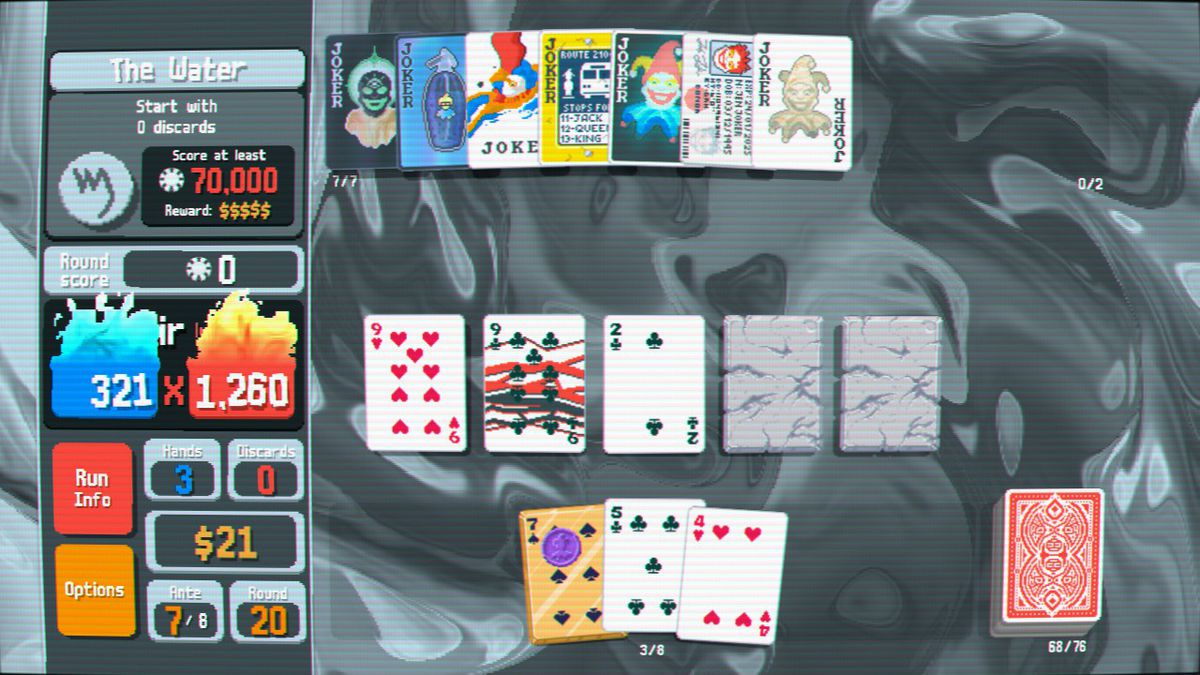
Still, basically every aspect of Balatro centers on the experience and essence of gambling. Roguelite progression in general always relies on randomness and chance to keep players engaged. In Balatro in particular, the numerous rewards early on for completing rounds and using more Joker cards makes the player crave other potential surprise goodies. Moreover, unless you want to do the math in your head (or write everything down on a piece of paper), you’re not always sure what score you’ll get from each hand until you play it. Much like $10 Black Jack tables or slot machines, Balatro relies on players taking risks and never being fully sure if they’ll work out.
Even the audio-visual presentation of the game gives off a sleazy casino vibe. Only one (brilliant) music track plays the entire time, and its slow, haunting vibe constantly makes me feel like I’m trapped in a vortex. The art direction, meanwhile, is reminiscent of arcade-style poker machines. Though I’m playing on a standard Nintendo Switch screen, the game tries to ape classic CRT television visuals, with a slightly rounded frame and a faint blur covering everything. On a sonic and aesthetic level, Balatro sucks the player in and refuses to let go, giving you whiffs of opportunity within a never-ending cycle of repetition.
Balatro is brilliant, and so far my favorite game of 2024. Maybe I’ll break the current habit I’m in—returning to the game on a near-daily basis even when I think I’m “done” with it—but I’m not quite there yet. Still, what continues to amaze me is that Balatro manages to create all the atmosphere and vibes around a serious gambling operation, yet without any of the stakes. There are no microtransactions to speak of, and no other signs of player exploitation that I can identify. (The game was actually removed from a few e-shops for promoting gambling, but returned when investigators failed to find any threats to gamers.) Balatro provides the feeling of being addicted to gambling with none of the downsides.
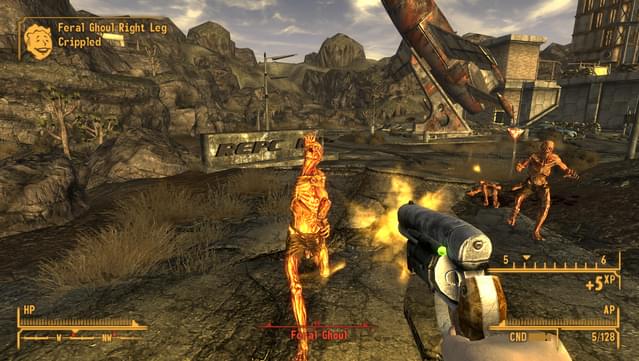
You Can Always Go Back
Every now and then, I find myself in a gaming rut. When this happens, whatever games I’m in the middle of playing become of little interest to me, nothing new seems worth buying at the moment, and none of the games in my backlog have much appeal. I’ll emerge from this funk eventually, at which point I’ll happily return to Final Fantasy VII Rebirth (a game I was mostly enjoying, though I also found it exhausting). In the meantime, however, I’m still in the rut.
Typically, the way to get out of this is either A) spend more time with not-gaming activities (the horror!) or B) replay an oldie. This time, reader, I did what everybody seems to be doing lately with the release of the surprisingly good Amazon Prime show and decided to revisit an old Fallout game. In this case, I went for Obsidian’s 2010 effort, Fallout: New Vegas.
For context: Fallout 3 (2008, Bethesda) is one of my favorite RPGs and remains high on my list of best Xbox 360-era experiences. While I didn’t try its spinoff New Vegas when it first came out in 2010, I gave it a shot a couple years later, and Fallout: New Vegas simply didn’t click with me the same way. Part of that was likely due to my life circumstances at the time. I was a senior in college, focused on applying for a job (that I would ultimately despise and quit after three months) and making the most of my final days as an adult-but-not-a-grown-up. Additionally, the game was also a buggy mess that, at least from a vibes perspective, lacked the impact that its predecessor did in 2008. I put it down after maybe five to six hours and never looked back…until now.

After playing roughly a dozen hours of New Vegas after more than a decade away, I’ve come to admire it way more, even if I still wouldn’t place it above Fallout 3 in my series rankings. The plot has more twists and turns than I remember, the gameplay strikes a new balance between approachability and friction, and the New Vegas radio stations are just as (if not more) charming than what we get in the rest of the series. The game is still clunky, unpolished, and full of glitches, but the positives far outweigh the negatives.
In particular, I’ve gained a greater appreciation for all the different gangs and factions in the New Vegas region. As a result of various actions I’ve taken so far, there are places where I will be attacked on sight, and others where I get nice discounts on goods and services. Every time I take a quest, I have to be mindful of who I’m helping or hurting. Whenever I find a new town, I feel the need to ask locals a ton of questions just to make sure whether I’m in New California Republic territory or if I have to worry about Caesar’s Legion coming through. I figured returning to New Vegas would be a good (enough) time, but I’m fully sucked into its world right now.
There’s still a part of me that feels a nagging guilt around temporarily dropping Final Fantasy VII: Rebirth just a few weeks after its release as well as failing to address my stated backlog just to give a 2010 Xbox 360 game another try because of an Amazon Prime show. Ultimately, though, isn’t this all supposed to be fun? I hit a point where I wasn’t having fun with Rebirth, and I’m having tons with Fallout: New Vegas. All the other games I mean to play (and finish) will still be there once I’m done wandering through the Mojave desert. I went back to play New Vegas, and I can always go back to Rebirth.
Remember, kids: You can always go back.
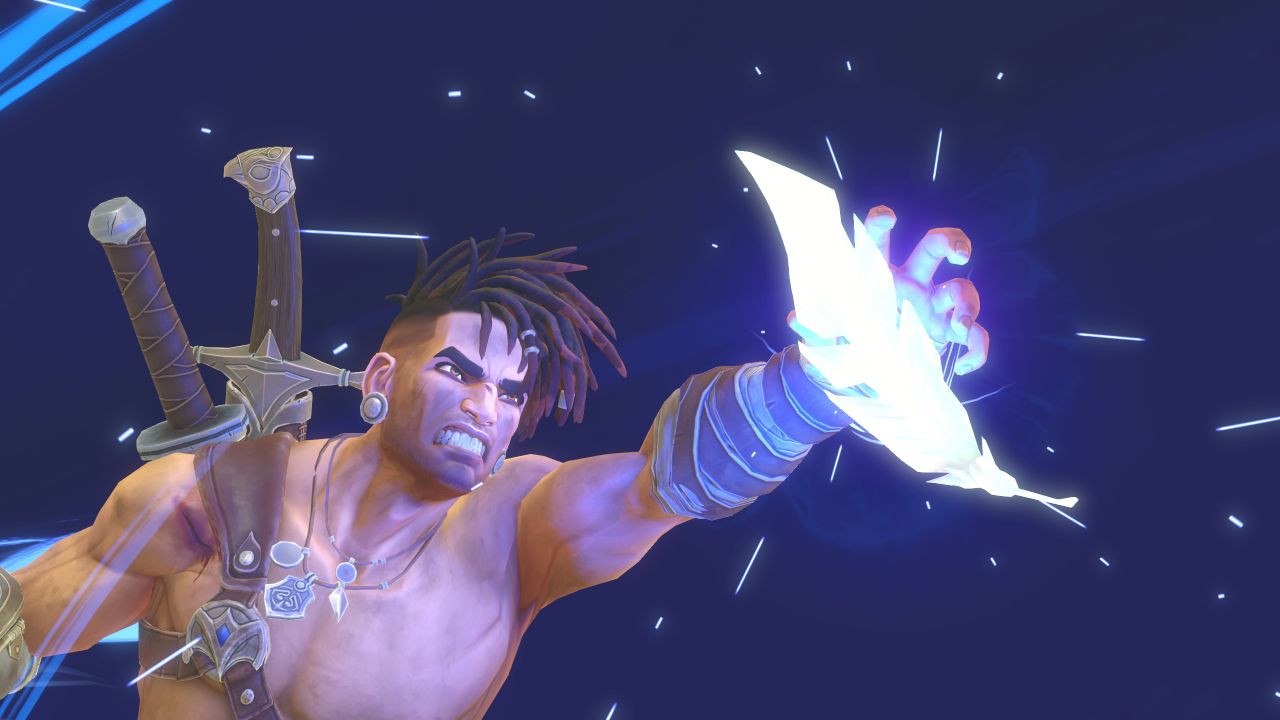
LIGHTNING ROUND!!!!!!!!!!!!!!!!!!!!!!!!!!!!!!!!!
- My replay of Fallout: New Vegas has inspired a new adage for me: When in doubt, play an Xbox 360 game. This also applies to the Super Nintendo and GameCube.
- Quick note about the Fallout TV show: It’s a really impressive example of how to translate a video game’s core vibes, mechanics, and systems into something scripted and character-based. I was very skeptical of this show at first, since the emergent narrative gameplay and open-ended nature of the Fallout games doesn’t necessarily work for linear storytelling, but Jonathan Nolan and company really knocked it out of the park with this one.
- I finally got around to Prince of Persia: The Lost Crown. It’s a really good metroidvania with some awesome platforming and combat, but I’m not really sure what else I want to say about it. I found the plot mostly boring, and once I finished the main story, I felt little pull to 100% the game. Still, it’s a really well-designed 2D game that I hope won’t get lost in the shuffle of this year’s new releases.
- I also finally played Penny’s Big Breakaway after hyping it up at the start of the year, and it did not disappoint. The game has all the makings of a really good 2000s-era 3D platformer, but, more importantly, it manages to capture the essential elements of Dreamcast-era games: funky soundtrack, simple control scheme that allows for a multitude of playstyles, and dreamlike level design. The only real drawbacks are its general bugginess (something else reminiscent of that era, I guess) and that some of its boss fights are simultaneously basic and frustrating.
- F-Zero: Maximum Velocity, a Game Boy Advance launch title that was recently added to Nintendo Switch Online, serves as a good reminder that driving really fast vehicles in futuristic environments will always be sick as hell.
- Another recent Switch Online addition that you don’t want to miss: Extreme-G Racing for the Nintendo 64. It’s another futuristic racer (kind of like F-Zero), but with consumable items/weapons a la Mario Kart. Not an all-time classic, but a fun experience nonetheless.
- I’m in a weird spot with MLB The Show 24. On the one hand, it’s still a great baseball sim. I love March to October, and I appreciate the continuation of the Stories mode, especially with the addition of Derek Jeter. On the other hand, though, there’s basically nothing particularly new or exciting in this game that didn’t exist in some form in previous versions. The graphics don’t look any better, the core mechanics haven’t been changed at all, and the presentation isn’t even altered in any meaningful way. I understand that sports franchises tend to value consistency year-to-year, but I’d like more reasons to dive into The Show each year outside of updated rosters. (Zack touched on this as well in his recent argument for why the GameCube’s Mario Superstar Baseball is the best baseball video game of all time.)
- I gave the Switch remake of Mario vs. Donkey Kong a shot recently, and you know what? It’s not bad. The level design strikes a nice balance between simple construction and optional challenge, and the updated graphics and sound design make it feel closer to a brand new game than a simple GBA remake. It’s not Earth-shattering or anything, just a pretty good game that’s exactly what you’d expect.
- Typically, I end the Punished Notes Lightning Round with a brief commentary on something outside of gaming culture. For this edition, I was originally going to write about everything disgraceful and sad about the Oakland Athletics. Instead, I just want to quickly honor my friend Alexander Toy, who passed away recently. I’m still working through grief in many forms, so all I want to say right now is this: Appreciate the people in your life while you still can. You never know what’ll happen tomorrow, next week, next month, next year. If you wish to donate to Grace Church School’s reimagining of its early childhood playdeck in Alex’s name, please do so here.
Sam has been playing video games since his earliest years and has been writing about them since 2016. He’s a big fan of Nintendo games and complaining about The Last of Us Part II. You either agree wholeheartedly with his opinions or despise them. There is no in between.
A lifelong New Yorker, Sam views gaming as far more than a silly little pastime, and hopes though critical analysis and in-depth reviews to better understand the medium's artistic merit.
Twitter: @sam_martinelli.


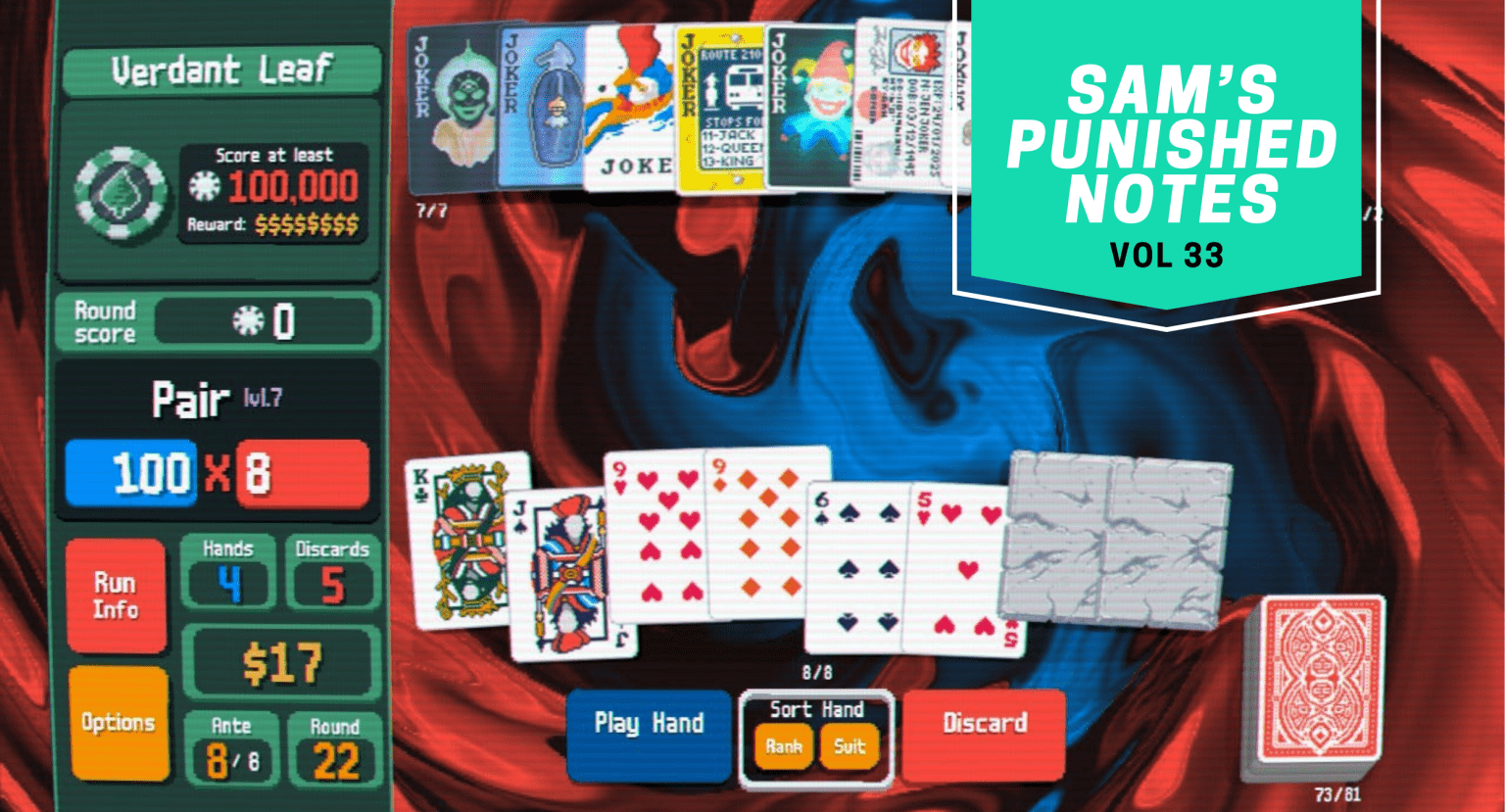






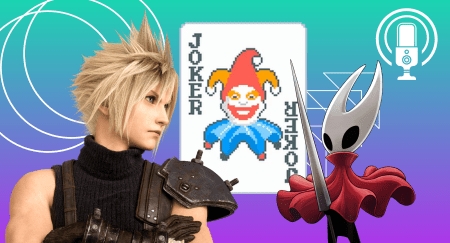
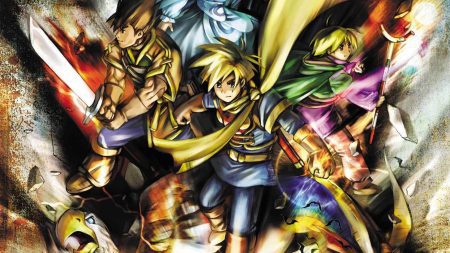
I’m so sorry for your loss, Sam <3 Thank you for sharing about Alex. I’m glad you’re finding solace and new joy in returning to (older) games.